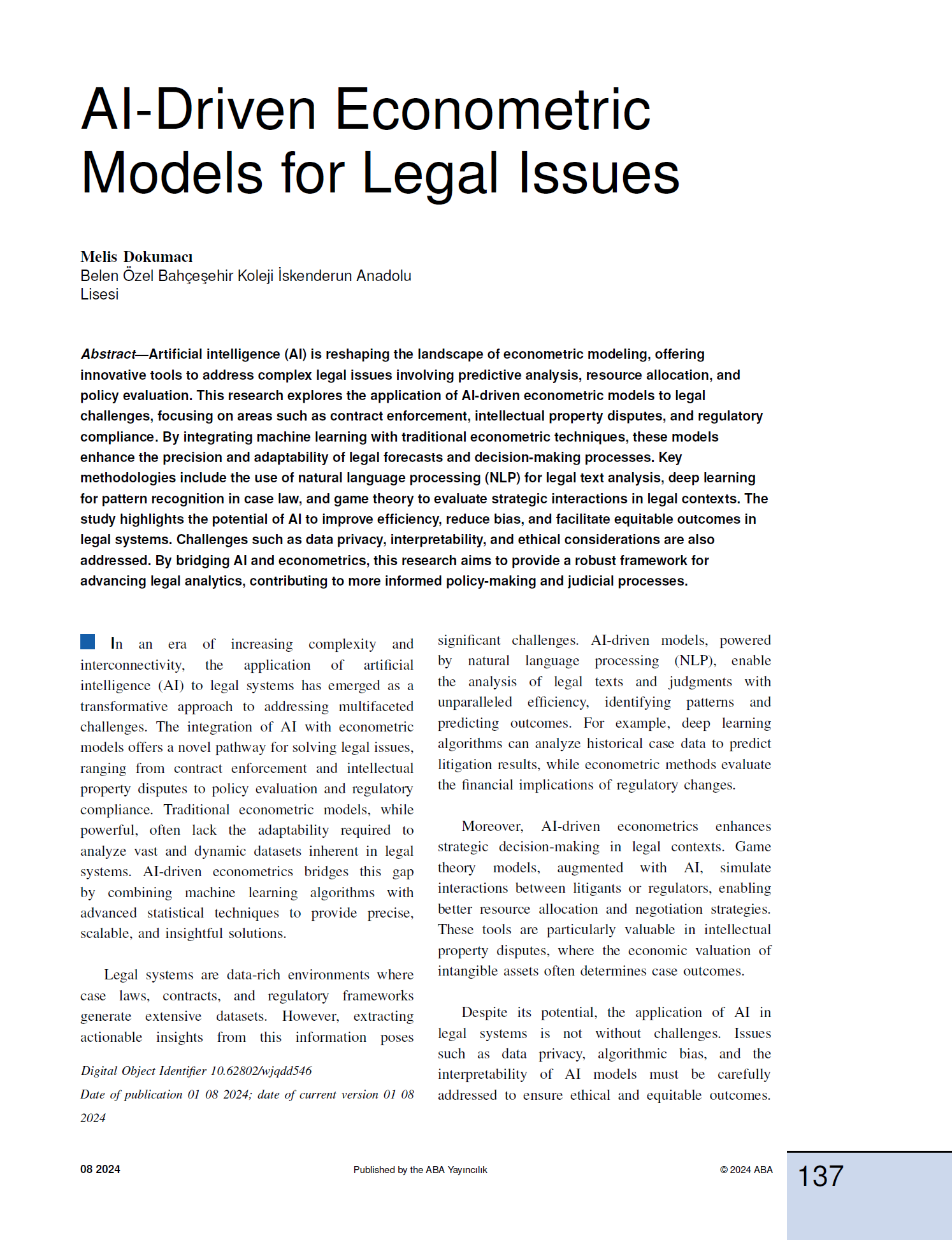AI-Driven Econometric Models for Legal Issues
DOI:
https://doi.org/10.62802/btfvze98Keywords:
AI-driven econometrics, legal analytics, machine learning, regulatory compliance, contract enforcement, intellectual property, natural language processing, predictive modeling, game theory, ethical AIAbstract
Artificial intelligence (AI) is reshaping the landscape of econometric modeling, offering innovative tools to address complex legal issues involving predictive analysis, resource allocation, and policy evaluation. This research explores the application of AI-driven econometric models to legal challenges, focusing on areas such as contract enforcement, intellectual property disputes, and regulatory compliance. By integrating machine learning with traditional econometric techniques, these models enhance the precision and adaptability of legal forecasts and decision-making processes. Key methodologies include the use of natural language processing (NLP) for legal text analysis, deep learning for pattern recognition in case law, and game theory to evaluate strategic interactions in legal contexts. The study highlights the potential of AI to improve efficiency, reduce bias, and facilitate equitable outcomes in legal systems. Challenges such as data privacy, interpretability, and ethical considerations are also addressed. By bridging AI and econometrics, this research aims to provide a robust framework for advancing legal analytics, contributing to more informed policy-making and judicial processes.
References
Agu, E. E., Abhulimen, A. O., Obiki-Osafiele, A. N., Osundare, O. S., Adeniran, I. A., & Efunniyi, C. P. (2024). Discussing ethical considerations and solutions for ensuring fairness in AI-driven financial services. International Journal of Frontier Research in Science, 3(2), 001-009.
Alhitmi, H. K., Mardiah, A., Al-Sulaiti, K. I., & Abbas, J. (2024). Data security and privacy concerns of AI-driven marketing in the context of economics and business field: an exploration into possible solutions. Cogent Business & Management, 11(1), 2393743.
Aparicio García, J. (2024). Legal Finance Analytics: a data-driven proposal of asset pricing litigation risk applied to international investment arbitration.
Challoumis-Κωνσταντίνος Χαλλουμής, C. (2024, September). What Challenges Does AI Present to the Cycle of Money and Economocracy?. In XIII international scientific conference. Toronto. Canada.
Gatla, T. R. (2024). AI-driven Regulatory Compliance for Financial Institutions: Examining How AI Can Assist in Monitoring and Complying With Ever-changing Financial Regulations.
Olabanji, S. O., Oladoyinbo, O. B., Asonze, C. U., Oladoyinbo, T. O., Ajayi, S. A., & Olaniyi, O. O. (2024). Effect of adopting AI to explore big data on personally identifiable information (PII) for financial and economic data transformation. Available at SSRN 4739227.
Shaik, A. S., Alshibani, S. M., Jain, G., Gupta, B., & Mehrotra, A. (2024). Artificial intelligence (AI)‐driven strategic business model innovations in small‐and medium‐sized enterprises. Insights on technological and strategic enablers for carbon neutral businesses. Business Strategy and the Environment, 33(4), 2731-2751.
Umronov, E., Kadirov, A., Abdujabborov, A., Muydinov, I., Karimova, M., & Sobirjonov, T. (2024, May). Economic Levels Forecasting System By Evaluating with more Accuracy Using ML, DL and AI Systems. In 2024 4th International Conference on Advance Computing and Innovative Technologies in Engineering (ICACITE) (pp. 1027-1031). IEEE.
Uzougbo, N. S., Ikegwu, C. G., & Adewusi, A. O. (2024). Legal accountability and ethical considerations of AI in financial services. GSC Advanced Research and Reviews, 19(2), 130-142.
Xu, J., Wang, H., Zhong, Y., Qin, L., & Cheng, Q. (2024). Predict and Optimize Financial Services Risk Using AI-driven Technology. Academic Journal of Science and Technology, 10(1), 299-304.


